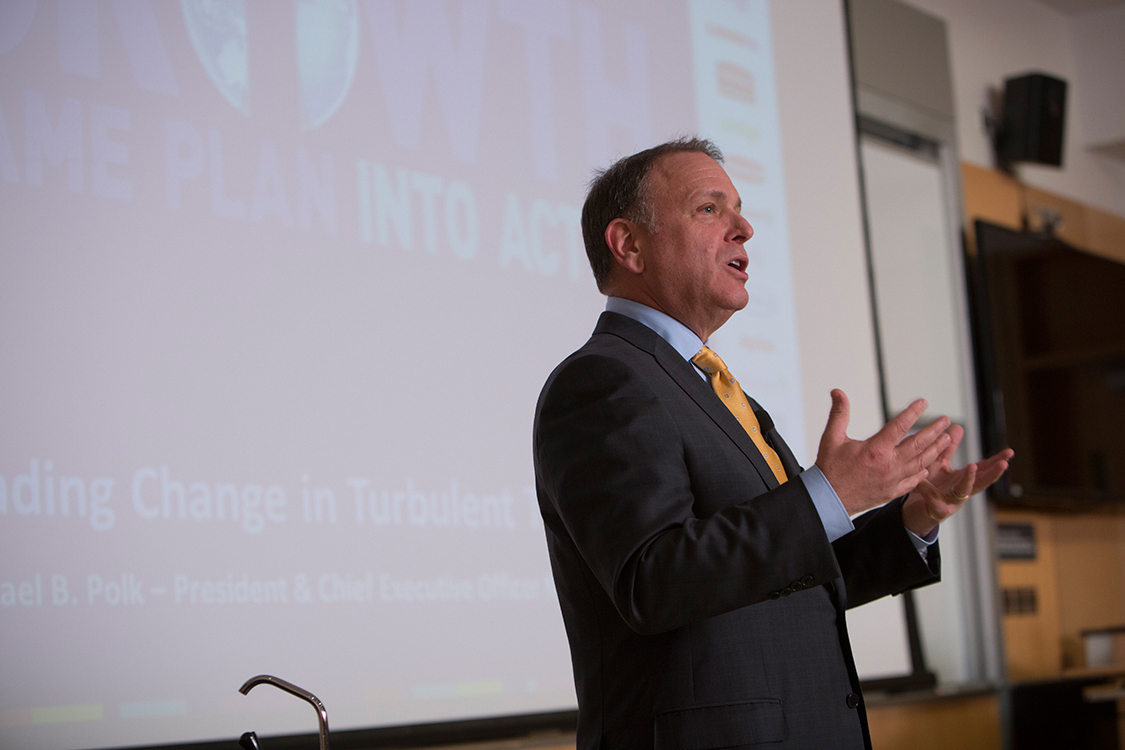Durland lecturer: Diversify skills, experiences to lead
By Katelyn Godoy

Michael B. Polk ’82, president and CEO of Newell Rubbermaid, talked about leading his company through restructuring and growth and how he prepared for the task when he delivered the 28th annual Lewis H. Durland Memorial Lecture March 14.
Polk, who has worked in branding and consumer goods for most of his career, joined the Newell Rubbermaid board of directors in 2009 and became president and CEO in 2011. Despite the company’s profitability at the time, Polk entered his role during a period of “chaotic movements and unprecedented volatility” in the world, he said.
“As a leader of a business who’s trying to grow and step up performance,” Polk said, one needs “to be able to ride those waves and shifts.”
Newell Rubbermaid owns more than 40 brands, including Sharpie, Graco and Calphalon.
In 2012, Polk and Newell Rubbermaid made the difficult decision to let go 50 percent of its vice presidents and 18 percent of the company. It took on a new, flattened organizational structure focused on development and delivery of its brands. Savings were invested into the company’s talent and capabilities.
Newell Rubbermaid’s projects are now bigger and better, and teams can think of possibilities rather than probabilities, Polk explained.
“We made this choice deliberately, but we didn’t do it lightly,” he said. “It was incredibly disruptive to people’s lives and to the way the organization was working. We did it because we knew we needed to in order to release the growth potential in the business.”
Polk described how he led Newell Rubbermaid through these changes by internal communication of a clear business strategy, called the Growth Game Plan, and fostering a forward-looking culture. He drew on diverse skills he had developed throughout his career and modeled behavior he wanted his colleagues to exhibit. Over the years, Polk said, he has embraced continued learning, diversifying skills and following mentors.
“Try not to chart a career path – put yourself in positions to learn and grow,” he said. “In the beginning of my career, it was all about putting building blocks in place. Don’t think vertically in terms of your career development, but think about the toolkit that’s going to enable you to be successful and lead an organization in the future.”
Last December, Newell Rubbermaid announced it would acquire Jarden and create a $16 billion consumer goods company, Newell Brands, with 57,000 employees. This deal will be finalized within a couple months, and Polk knows there is more change to come.
“Now, as we go into this next round of changes, it’s not just me and a few others trying to sell a new operating model to the organization,” he said. “It’s a group of people that have lived in this environment for the last five years, have grown with it, and are there to share their stories with their new Jarden colleagues.”
Speaking on his work for companies such as Unilever and Kraft Foods, Polk said there is no better time than now to graduate with an interest in brands and marketing. How consumers view, engage with and make decisions about marketing messages is changing.
“It’s like the movement from radio to TV,” he said. “You’re like an explorer trying to help us ‘old dudes’ who didn’t grow up in this media environment figure out how to invest so we can convert consumers to purchase.”
Polk said he never had a master plan. He took his first job after graduating from the College of Engineering to be close to his girlfriend, a Cornell Law School student, his friends in The Hangovers and Cornell hockey.
“Just get out there and get going,” he said. “Build a track record of performance, make sure you’re learning and building new skills as you go, and things will happen for you.”
The Lewis H. Durland Memorial Lecture is presented by the Samuel Curtis Johnson Graduate School of Management. It was established in 1983 in memory of Lew Durland, treasurer emeritus of Cornell.
Katelyn Godoy is content specialist at Johnson.
Media Contact
Get Cornell news delivered right to your inbox.
Subscribe